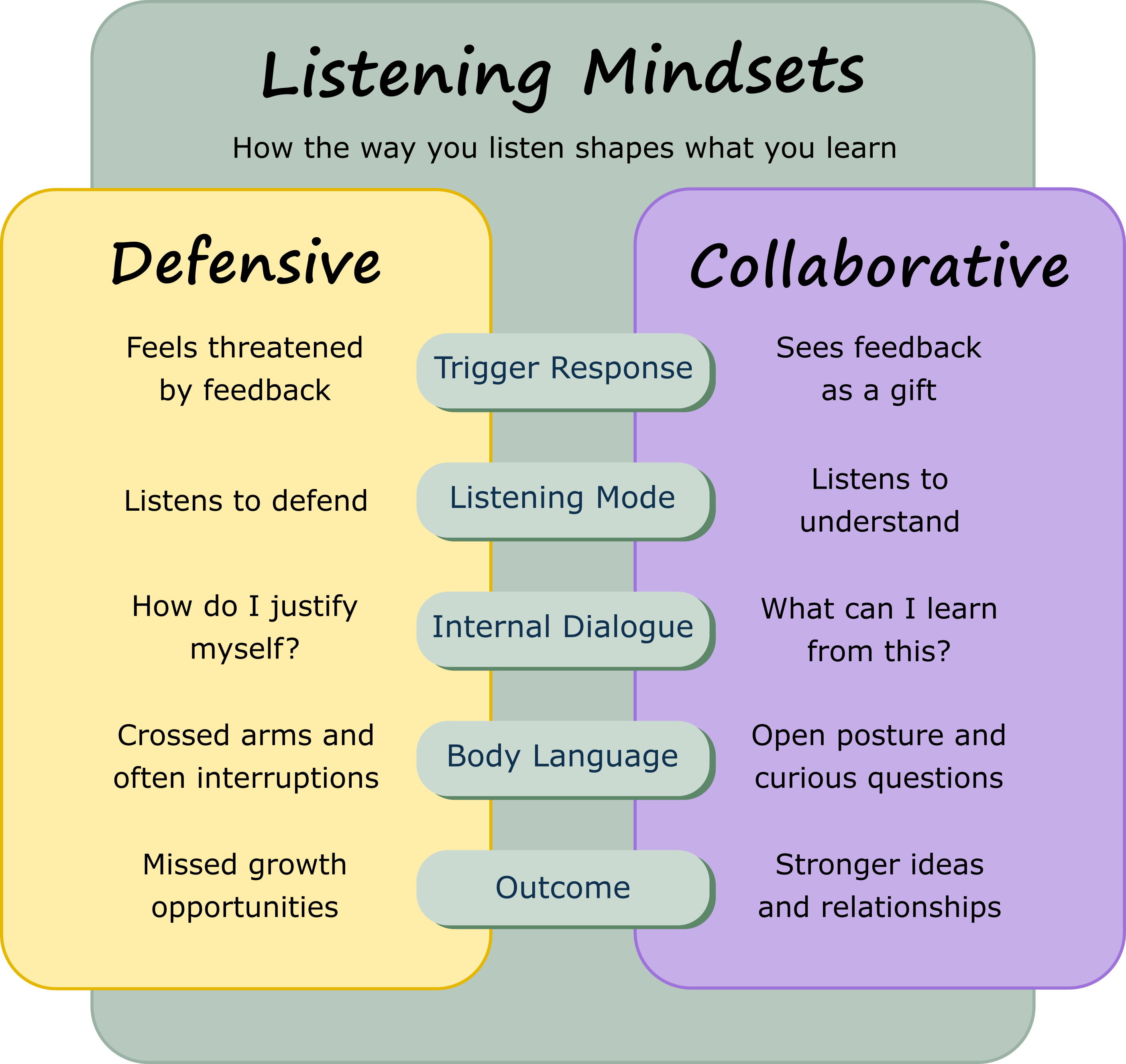The One Simple Shift to Become a Better Listener

Listening is more than just hearing words—it’s about truly understanding the person speaking. Yet, many of us struggle with it, often without realizing it.
When someone shares their thoughts, we might be busy preparing our response, waiting for our turn, or even feeling defensive if their words challenge our beliefs. This communication breakdown can lead to frustration, disconnection, and missed opportunities for growth.
The good news? A simple mindset shift can transform how we listen and engage with others. By replacing a defensive mindset with a collaborative mindset, we can create stronger relationships, communicate more effectively, and become better learners. This post explores how this shift can make all the difference, starting with a moment that made me realize I wasn’t as good a listener as I thought.
🎓A Life Lesson in Active Listening
It was a warm but windy spring afternoon at the University of Illinois on Green Street. I had just finished my last class for the semester and was ready to get summer break started. I pushed open the heavy doors of Everitt Lab. As I walked, a voice behind me jolted me back like a kite line pulling a kite.
“Hey, Tim! Wait up.” It was Paul, a fellow student I had met a while ago. I waited as he approached.
“What’s your plan for the summer?” Paul asked, falling into step with me.
I started to form my reply, but Paul's excitement took over before my words could take off. His news soared—Microsoft internship, big plans—and I stood silently, unsure how to respond.
I realized he didn’t care about my plans. He just wanted to talk about his.
That moment stuck with me. It made me start noticing how often communication breakdowns happen in everyday life. These small lapses in active listening frequently leave one unheard, fueling disconnection and sometimes leading to frustration or defensiveness.
🧠Why We Struggle to Listen
I wasn’t just the recipient of poor listening—I was guilty of delivering it, too.
During my first internship, after I had presented a software project at work, my manager and mentor sat me down to share feedback.
As they spoke, I wasn’t truly listening. Instead, I felt my defenses rising. My mind was racing to justify my decisions and prepare explanations instead of absorbing what they were saying.
At that moment, I was Paul.
In the Hidden Brain episode Are You Listening?, social scientist Guy Itzchakov describes this common trap:
When we feel our competence or values are being questioned, we stop listening and start protecting.
We treat feedback as a threat rather than an opportunity to grow, and that’s exactly what I was doing.
This self-protective barrier to listening prevented me from improving my presentation skills—and more importantly, from connecting with the people trying to help me.
🧩The Psychology of Active Listening
Carl Rogers, one of the founders of humanistic psychology, once noted:
One reason for our poor communication is that we fear that if we really listen, we might need to change.
That fear was familiar to me.
I’ve always been proud of my work—the technical details, the creative thinking, the polish. My projects felt like extensions of myself. So when feedback came, it felt like I was under review, not just the work.
That attachment blinded me.
Instead of seeing feedback as a helpful nudge from someone on my side, I saw it as a threat to my competence or authority. I wasn’t listening to collaborate—I was listening to defend.
🔄The Shift: A Collaborative Mindset
Everything began to change when I applied a new mindset: listen to collaborate, not to defend.
This new mindset helped me gain perspective on others’ views. I realized that people were not there to put me down. Instead, they were helping me see things I wouldn’t have been able to on my own.
It was by staying collaborative and being curious about their perspectives that my work could improve.
🖼️ From Defending to Collaborating
This visual summarizes the mindset shift that changed how I listen:

By adopting the collaborative listening approach, I became a better listener. Before, I reacted defensively to constructive criticism, defending rather than understanding. Now, I slow down before reacting. And when I respond, it’s from a place of collaboration rather than defense.
🎯Bringing It All Together
At its core, listening isn’t just about staying quiet while the other person speaks.
It’s about setting aside our defenses and embracing a collaborative and curious mindset—so we can truly understand, grow, and connect more deeply with others.
In your next conversation, pause before reacting. Ask yourself:
Am I listening to defend—or to understand?
The answer might change more than just the conversation. It might change the relationship.
✅Action Items
- Challenge yourself to notice how you react in conversations today. Are you listening to defend or to understand?
- Practice the collaborative mindset and actively summarize and ask questions during a conversation.
- Listen to the Hidden Brain podcast episode "Are You Listening?". It delves deeper into the psychology of listening and how it can transform your interactions.






Comments ()